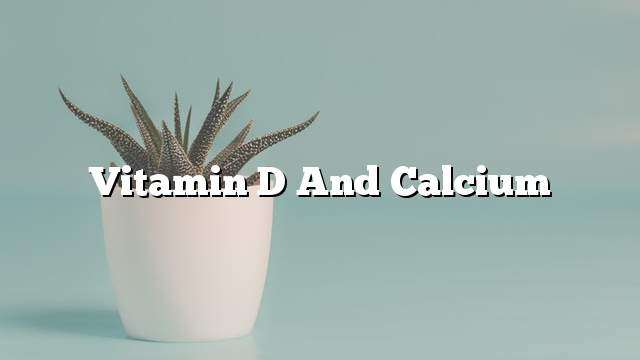Vitamin D and calcium
Vitamin D and calcium are the most important nutrients for healthy bones and teeth. Therefore, the body needs adequate calcium and vitamin D to avoid diseases that may affect the bones. The body needs between 800 and 800 units of vitamin D. The amount varies by age. For more than a thousand milligrams of calcium, and increase in the case of pregnancy, where up to one thousand and three hundred milligrams, and vitamin D of vitamins dissolved in fat, a vitamin produced in the body due to exposure to sunlight for a sufficient time, and contains a few foods naturally vitamin D . Vitamin D is one of the essential vitamins for human health. Its deficiency causes many serious health problems such as depression, osteoporosis, and immune system weakness, so the sun needs to be exposed sufficiently for the body to produce it.
Calcium is a mineral that is useful for health. It is stored in the bones and teeth, which helps to strengthen it and prevent fractures or fragility. It is also a mineral that the body needs for muscle movement. It enters the process of transmitting nerve messages in the body. Calcium helps to secret hormones and enzymes. Biological processes.
The Importance Of Calcium And Vitamin D For Bone
Vitamin D is one of the essential vitamins for bone health. It contributes to its formation, increases bone density, increases absorption of calcium and phosphorus in the small intestine. Vitamin D deficiency reduces the absorption of calcium from foods, so the body withdraws its calcium from the bones. Osteoporosis, and increased fracture. Vitamin D helps the growth of bone cells. Vitamin D deficiency should be compensated by eating the foods that contain it and exposing the skin to the sun. You should also consult your doctor to take vitamin D supplements. T-containing calcium to prevent osteoporosis.
Foods rich in vitamin D
- Fatty fish like salmon and tuna.
- yolk.
- Liver of the sheep.
- whale liver oil.
- Orange juice fortified with vitamin D.
- Vitamin D-fortified milk
- Corn flakes supported by vitamin D.
Foods containing calcium
- Green vegetables such as broccoli, peas and green beans.
- Soybeans and their products Caltophy and soy milk.
- Seeds of flax.
- Milk and dairy products from milk and cheese.
- Pasteurized or dry milk fortified with calcium.
- Calcium-fortified juices.
- Legumes such as chickpeas and lentils.
- Fruits like apricot, black plums, pomegranate and hibiscus.
